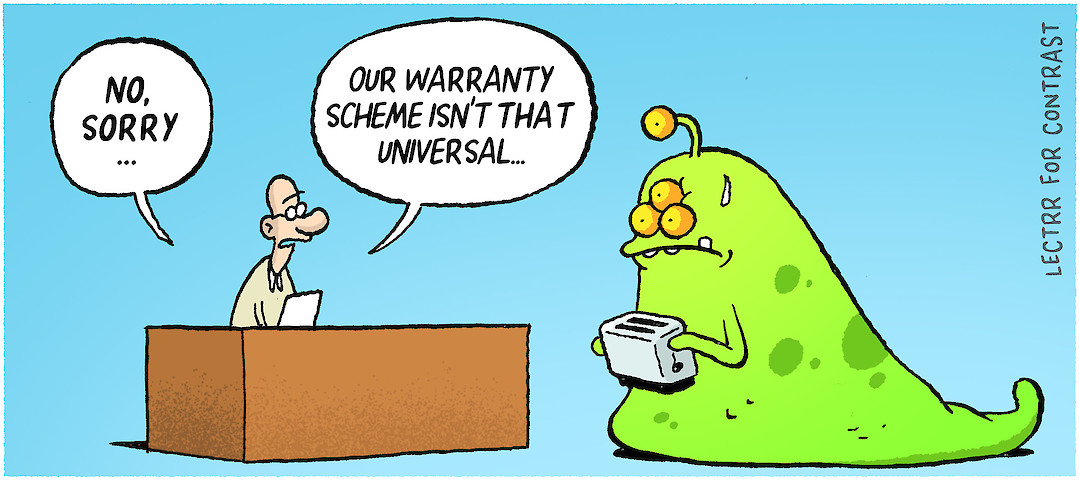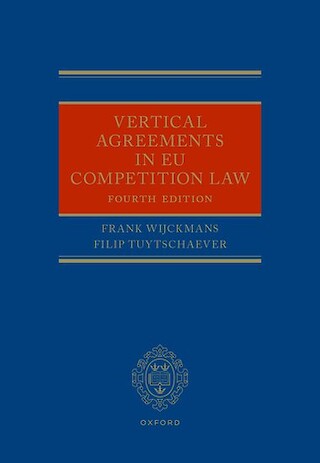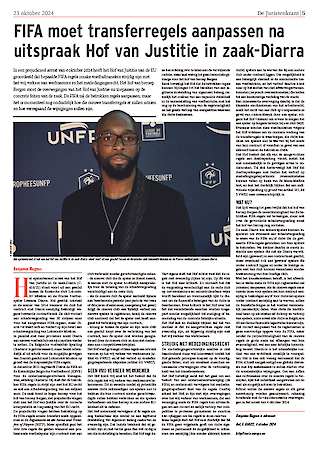In the Picture

Just how far does my guarantee go?
February 2019Imagine…
Your computers are distributed within the EU via a network of national importers. Your company has been very successful everywhere - except in Germany. Your sales manager suspects that this is due to the presence of a competitor who offers a 5-year guarantee. Your own guarantee is limited to 2 years. To counter this, you decide to offer, via your German importer, the same guarantee as your competitor.
One day you receive a furious letter from a German customer. Three years ago he bought a laptop via a French website with competitive prices and now he wants to invoke the 5-year guarantee in Germany. However, the customer service department of the store in Germany informed him that he only enjoys the guarantee´s coverage in France - which coverage has in the meantime expired. According to the customer, this is a flagrant restriction of trade between member states and a violation of competition law. You have to set up a uniform European guarantee scheme, and it must apply regardless of where the consumer actually purchased the product.
You are taken aback. Are you really obliged to ensure that a customer who buys a product in France, with a French guarantee, can invoke that guarantee in Germany? And do you have to ensure that a uniform guarantee scheme applies for your products throughout the EU?
A brief clarification.
Roughly speaking, there are two types of guarantees: the legal guarantee (or consumer guarantee), and the commercial guarantee.
The legal guarantee offers throughout the EU a minimum protection to consumers for the purchase of consumer goods. The protection applies when the lack of conformity of a good is established within a minimum of 2 years after its delivery. The consumer can contact the end seller for free repair or replacement of the good, and possibly for an appropriate price reduction or the dissolution of the sale contract.
A commercial guarantee (or manufacturer´s guarantee, if provided by the manufacturer) is not legally required. The producer or distributor (importer, wholesaler or retailer) is free to define its contents, term and the rights it offers. Under the condition, however, that the rights which the consumer has on the basis of the legal guarantee remain unaffected and that the legal information obligations are respected. For his commercial guarantee, the consumer can turn directly to the company that granted it.
Thus companies do not have an obligation to provide a uniform commercial guarantee throughout the EU. The starting point of competition law is that a decentralised commercial guarantee does not constitute a problem per se, not even if this leads to the refusal of guarantee requests for goods purchased in a different member state. So, concretely, our manufacturer can offer - via its national importer - a different guarantee in Germany than in France, and the customer can be asked to exercise his guarantee in France and not in Germany.
However, caution is recommended in the case of selective distribution. According to the European Commission, a consumer must, without additional charges, be able to enjoy the commercial guarantee on a vehicle purchased at an authorised distributor in a different member state. Otherwise this can be regarded as a form of illegal territorial and customer restriction.
It is hard to see why the same reasoning should not apply to goods other than motor vehicles. Within a selective distribution network it would therefore be prudent to allow customers to invoke their commercial guarantee at every authorised distributor, regardless of the member state in which this distributor is established.
Once again, this does not mean that this guarantee must be uniform throughout the EU. The Commission is aware of the interaction between the price of a product and the guarantee that is associated with it. If our manufacturer were to distribute its computers via selective distribution, it can thus allow the customer who bought his laptop from the French (online) authorised distributor to invoke his guarantee throughout the EU, including at the German authorised distributors, but limited to the guarantee that applied to the purchase in France.
Concretely:
-
The legal guarantee is based on EU law and applies in each member state vis-à-vis the end seller on the basis of the national law of the member state where the guarantee is invoked. The periods differ from member state to member state.
-
A commercial guarantee is not legally required. Its contents, term and the rights it generates can generally be freely defined, provided that the legal guarantee remains unaffected and the applicable information obligations are respected.
-
It is recommended, within a selective distribution framework, to have the commercial guarantee apply at every authorised distributor in the EU. This does not mean that a commercial guarantee must be uniform throughout the EU. The customer is only entitled to a guarantee in accordance with the guarantee conditions that applied to the purchase.
- The existence of different commercial guarantees can have an impact on the trade between the EU member states. So long as this is not the result of an intentional allocation of customers or territory between the companies involved, there is no competition law violation.
Want to know more?
- Directive 1999/44/EC on certain aspects of the sale of consumer goods and associated guarantees: https://eur-lex.europa.eu/legal-content/EN/TXT/PDF/?uri=CELEX:31999L0044&from=EN
- The Belgian rules concerning the legal guarantee and commercial guarantee are contained in article 1649bis through 1649octies of the Civil Code.
- For guarantee schemes within the framework of selective distribution, see question 5 of the Motor Vehicles FAQ: http://ec.europa.eu/competition/sectors/motor_vehicles/legislation/mv_faq_en.pdf











